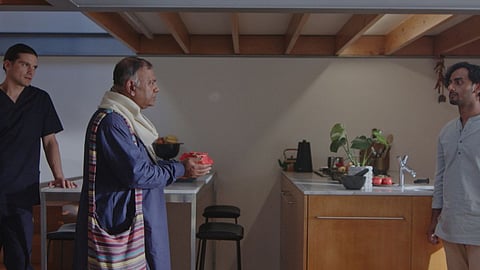
- LIFESTYLE
- FASHION
- FOOD
- ENTERTAINMENT
- EVENTS
- CULTURE
- VIDEOS
- WEB STORIES
- GALLERIES
- GADGETS
- CAR & BIKE
- SOCIETY
- TRAVEL
- NORTH EAST
- INDULGE CONNECT

For renowned filmmaker Onir, working on My Melbourne has been an unforgettable journey. The anthology, which features four films directed by Onir, Imtiaz Ali, Kabir Khan, and Rima Das, explores an array of themes that revolve around diversity, including sexuality, gender, disability, and race. The project, produced by Mitu Bhowmick Lange AM, comprises individual films titled Nandini (Onir), Jules (Imtiaz Ali), Setara (Kabir Khan), and Emma (Rima Das).
“We’ve all been in the industry for many years, and we each have our distinct style and secure creative space,” says Onir. “What ties this film together is its central theme of Melbourne, diversity and inclusion. It’s a celebration of people from various backgrounds—different abilities, races, sexualities, and genders—coming together. And the tram in Melbourne is an important thread that weaves these diverse stories together.”
Reflecting on his story in the anthology, Nandini, Onir explains, “It’s a deeply emotional story about a father who, after disowning his son over his sexuality, comes to seek reconciliation. After the mother’s death, he brings her ashes to his son in Australia, asking for forgiveness and acceptance. The story is told from the perspective of a migrant experience, and what makes it special is that most of it is in Bengali, given the Bengali migrant context. I was fortunate to cast a talented Australian-Bengali actor from Bangladesh to play the son, while the father is portrayed by an Australian Indian-Bengali actor.”
The Australian setting of the film also adds a unique layer to the project. “The entire cast and crew are from Australia,” Onir shares. “It’s a first for filmmakers from India to go to Australia, where we’re not just making a film but also training and collaborating with local talent. ”
When asked if there was an exchange of ideas, he says, “While we were aware of each other’s work, we didn’t engage in deep discussions about the process or style. Reema and I interacted more since we were shooting around the same time, and I shared my first cut with the others. A large part of the crew was the same.”
Ask Onir, who is known for his subjects that delve into gender identity and sexuality, if the audience is more accepting of these themes today, and pat comes the reply. “We’ve come a long way,” he says. “There was a time when our community was criminalised, and now, though it’s still a struggle, there’s progress. Narratives on gender and sexuality are becoming more mainstream. Queer narratives are still relatively rare, and often viewed through a heteronormative lens. Media has a tendency to box people, and gay filmmakers tend to get compartmentalised. Straight filmmakers don’t face the same scrutiny. It will take time but change is coming.”
Onir is also working on a sequel to his critically acclaimed film I Am. “Unlike I Am, the new project isn’t an anthology but a series of four films. The first, We Are Faheem and Karun, premiered at the Dharamshala International Film Festival. I’ll begin work on the second story next year.”
December 14, 12.15 pm. At Six Degrees PVR Sathyam Cinemas,Royapettah
Email: sangeetha.p@newindianexpress.com
X-@psangeetha2112